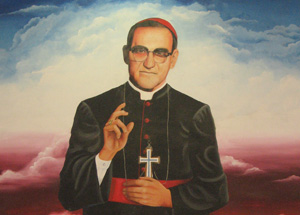 It was a powerfully symbolic moment. President Obama stood at the tomb of martyred Archbishop Oscar Romero in El Salvador, lit a candle, and paused in silent prayer. That gesture, with no words spoken, said volumes to Central America and the world. Some have suggested that an apology for the U.S. role in Romero's death was lacking, but the symbol of a U.S. president paying homage said much more.
It was a powerfully symbolic moment. President Obama stood at the tomb of martyred Archbishop Oscar Romero in El Salvador, lit a candle, and paused in silent prayer. That gesture, with no words spoken, said volumes to Central America and the world. Some have suggested that an apology for the U.S. role in Romero's death was lacking, but the symbol of a U.S. president paying homage said much more.
Today is the 31st anniversary of Archbishop Romero's death. He had been named Archbishop of San Salvador because of his conservative leanings in the midst of growing tension between the government and opposition forces. Less than a month after his appointment in 1977, Fr. Rutillo Grande, a friend and fellow priest instrumental in organizing peasants into Christian base communities, was brutally murdered. It sparked something in Romero, and in the next three years, he became an outspoken advocate for the poor.
By 1980, a military junta had taken power in El Salvador, and right-wing death squads roamed the streets. Romero grew ever louder in his opposition. In his final Sunday homily, the day before his death, Romero appealed to the Salvadoran army and National Guard,
"Brothers, you belong to our own people. You kill your own brother peasants; and in the face of an order to kill that is given by a man, the law of God should prevail that says: Do not kill! No soldier is obliged to obey an order counter to the law of God. No one has to comply with an immoral law. It is time now that you recover your conscience and obey its dictates rather than the command of sin. The Church, defender of the rights of God, of the law of God, of the dignity of the human person, cannot remain silent before so much abomination.
Got something to say about what you're reading? We value your feedback!